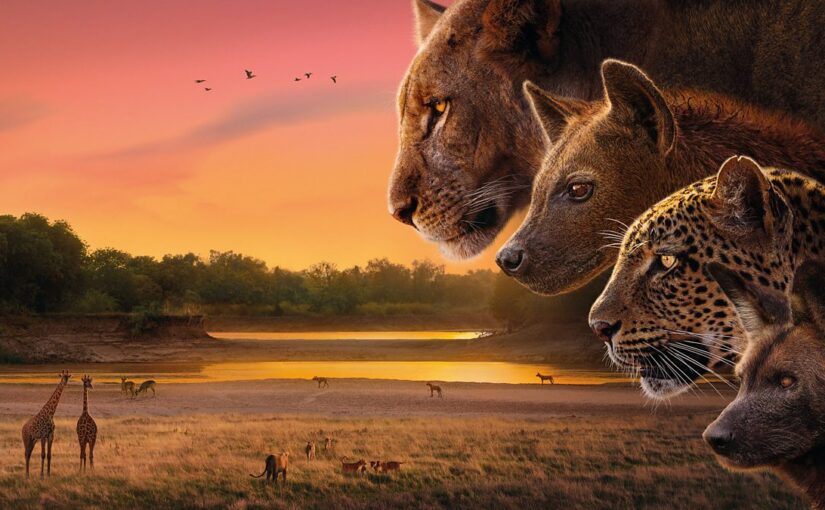In the remote river valleys of Zambia, where water sustains life and competition defines survival, the BBC Studios Natural History Unit has undertaken one of its most ambitious projects to date. Kingdom (2025) represents a groundbreaking commitment to wildlife storytelling, with filmmakers spending five years documenting the intersecting lives of four apex predator families in a single, spectacular location. This epic series follows leopards, hyenas, wild dogs, and lions as they navigate the delicate balance of power in a fertile wilderness where every day brings new challenges and the stakes could not be higher.
The river valley becomes a stage for nature’s most compelling drama. Leopards, masters of solitude and stealth, move through dappled shadows with calculated grace, their spotted coats providing perfect camouflage in the acacia groves. Hyenas, often misunderstood as mere scavengers, reveal their sophisticated social structures and formidable hunting prowess, their clan dynamics as complex as any royal court. Wild dogs, painted in nature’s most striking patterns, embody cooperation and endurance, their high-pitched calls echoing across the plains as they coordinate hunts with remarkable precision. Lions, the valley’s reigning monarchs, command respect through sheer presence, their tawny forms radiating authority as they defend territories that have sustained their bloodlines for generations.
The artistic vision behind Kingdom transforms wildlife observation into cinematic storytelling. Directors employ cutting-edge cinematography, from drone sweeps over mist-shrouded rivers to intimate ground-level shots that capture the flicker of a predator’s gaze. The storytelling delves into familial bonds that mirror human experiences: a lioness teaching her cubs to stalk, or hyenas mourning a fallen pack member under the starlit sky. These moments illuminate the cycle of life in the wild, where birth, nurturing, and loss play out against a backdrop of relentless adaptation. The series does not shy from the brutality; a failed hunt leaves a wild dog pack weakened, forcing them to scavenge amid hyena jeers. Yet, it balances ferocity with wonder, highlighting moments of respite, like leopards basking in the dawn’s first light, their forms silhouetted against the valley’s emerald expanse.
The narrative extends to a colorful ensemble of supporting species, each adding layers to the predators’ tales. Mighty elephant herds, with their rumbling migrations, trample paths that reshape the landscape, inadvertently aiding or hindering hunts. Vast flocks of crimson bee-eaters, iridescent jewels in the air, swarm in synchronized dances, their presence signaling seasonal shifts that influence prey availability. Troops of marauding baboons, bold and opportunistic, raid kills or harass lone predators, injecting chaos into the hierarchy. These interactions underscore the ecosystem’s interconnectedness; a baboon’s alarm call might alert lions to intruders, while bee-eaters’ nests become flashpoints in territorial disputes. Through these dynamics, Kingdom reveals how even the mightiest rulers depend on the valley’s symphony of life.
BBC’s legacy in wildlife documentaries sets a high bar, from the sweeping vistas of Planet Earth to the intimate revelations of Dynasties. Yet Kingdom pushes boundaries with its unprecedented commitment to a single location over half a decade. This long-term lens allows filmmakers to track generational arcs, witnessing cubs mature into challengers and prides rise and fall. The intimacy forged through patience yields footage of rare behaviors, like cooperative wild dog pursuits that span miles under the blistering sun. Such depth not only captivates but educates, portraying Africa’s majesty: the thunder of hooves on parched earth, the glint of fangs in moonlight, the quiet resilience of survivors amid drought and flood.
As Kingdom (2025) premieres, it invites reflection on the power of sustained storytelling in conservation. In an era of habitat loss and climate threats, this series spotlights Zambia’s river valleys as vital refuges, urging viewers to champion their preservation. By humanizing the wild through lyrical yet unflinching narratives, it fosters a deeper empathy for the creatures that rule these kingdoms, ensuring their legacies endure beyond the screen.
